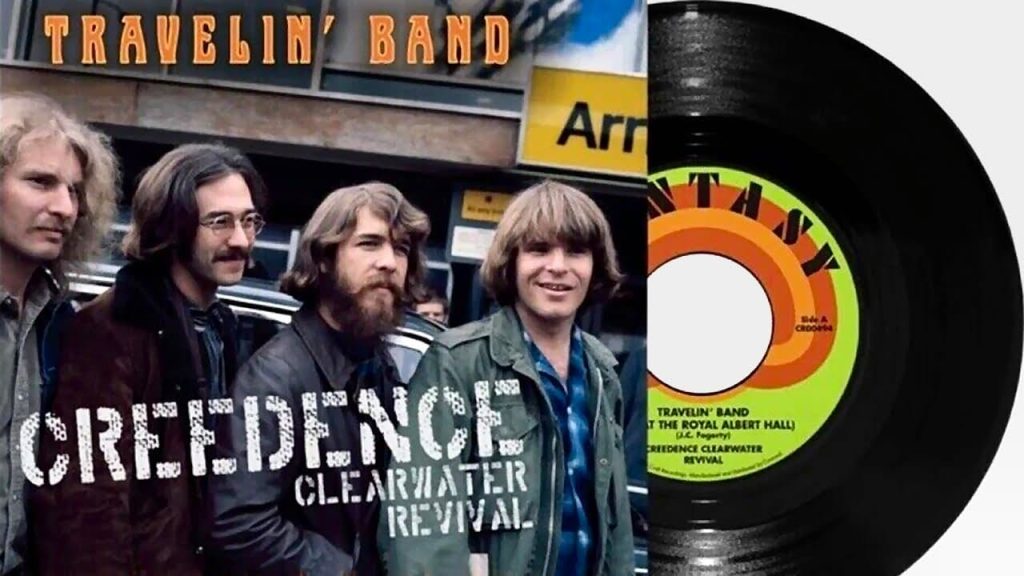
Creedence Clearwater Revival – “Who’ll Stop the Rain”: A Timeless Anthem of Resilience and Reflection
Released in 1970 as the B-side of the single “Travelin’ Band” and featured on their album Cosmo’s Factory, “Who’ll Stop the Rain” by Creedence Clearwater Revival (CCR) is a contemplative folk-rock anthem that reflects the turbulent social and political climate of its time. Written by the band’s frontman, John Fogerty, the song was released at the peak of the Vietnam War era and captures a sense of frustration, disillusionment, and resilience that resonated deeply with listeners then and continues to strike a chord today. It reached #2 on the Billboard Hot 100, affirming CCR’s powerful ability to connect with audiences through socially conscious lyrics and evocative melodies.
“Who’ll Stop the Rain” opens with an acoustic guitar riff that sets a somber yet hopeful tone. The song’s lyrics describe the narrator’s experience standing in “long lines” in the pouring rain, observing a world that seems caught in an unending storm. The rain itself becomes a metaphor, symbolizing the constant pressures, hardships, and injustices that people endure. Fogerty’s lyrics reflect a search for clarity and peace, asking the question, “Who’ll stop the rain?”—a plea for change and relief from the turbulence and confusion of the time. This powerful question remains open-ended, capturing a sense of collective uncertainty and a longing for answers.
Fogerty’s voice is imbued with a soulful intensity that brings out the song’s underlying urgency. His vocals are raw yet grounded, reflecting both the weariness of facing endless challenges and the determination to endure them. The melody is simple but stirring, a folk-inspired arrangement complemented by subtle electric guitar and a steady rhythm section that emphasizes the song’s timeless, grounded feel. The understated instrumentation allows the lyrics to take center stage, placing emphasis on the song’s message rather than overpowering it with elaborate arrangements.
The song’s lyrics are deeply symbolic, hinting at both the historical struggles of Fogerty’s time and broader themes of disillusionment with authority. Lines like “Good men through the ages, trying to find the sun” suggest that the search for truth and justice is an enduring human pursuit, with each generation facing its own struggles. There is also an undercurrent of frustration with leadership and empty promises, as Fogerty observes that “Five-year plans and new deals wrapped in golden chains” often fail to bring about the change they promise, leaving ordinary people to bear the brunt of hardship.
“Who’ll Stop the Rain” became an unofficial anthem for those opposing the Vietnam War, with many listeners interpreting it as a protest song. Though Fogerty himself has explained that the song is more broadly about the desire for peace and understanding in a world full of conflict and confusion, it’s clear that its message resonated with the anti-war movement and anyone feeling a sense of despair over the social issues of the time. The song’s universality has allowed it to transcend its original context, making it relevant for generations dealing with their own challenges and political uncertainties.
The enduring popularity of “Who’ll Stop the Rain” lies in its ability to express the frustrations of the common person, acknowledging the difficulties of life without offering simple answers. The repetition of the question “Who’ll stop the rain?” throughout the song serves as both a lament and a rallying cry, embodying the persistence of hope even in the face of prolonged struggle. Fogerty’s honest, heartfelt approach gives the song a timeless quality, resonating with listeners who feel that same desire for clarity and resolution in their own lives.
As the song closes, it leaves the question unanswered, allowing listeners to project their own experiences and interpretations onto it. Whether viewed as a metaphor for personal struggles, political disillusionment, or the trials of the human condition, “Who’ll Stop the Rain” continues to inspire reflection and solidarity. Its folk-rock roots give it an approachable feel, while its lyrical depth invites listeners to think deeply about their own journeys and the world around them.
In conclusion, “Who’ll Stop the Rain” by Creedence Clearwater Revival is a powerful and timeless song that captures the spirit of resilience and reflection. Its simple melody, haunting lyrics, and evocative vocal delivery make it a compelling piece that resonates with people across generations. By blending personal vulnerability with a broader social message, CCR created a song that remains as relevant and moving today as it was over fifty years ago.